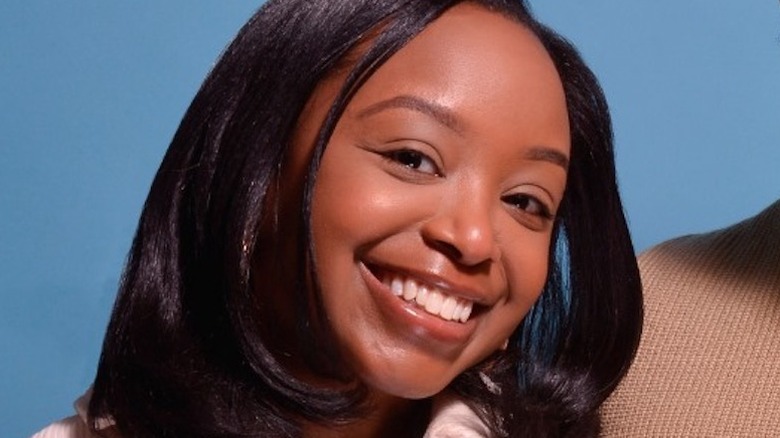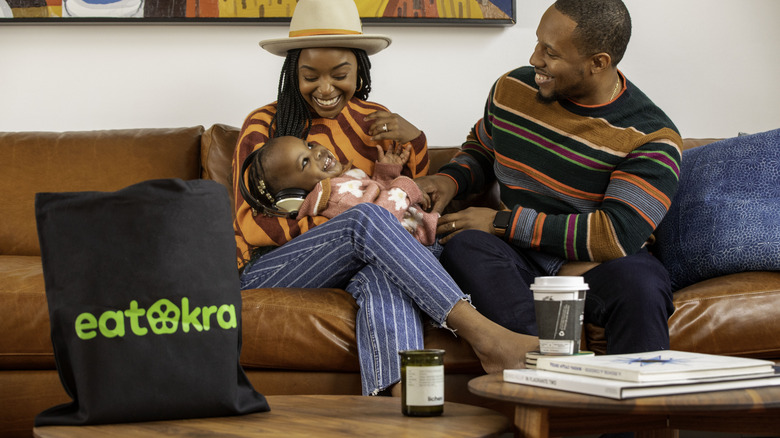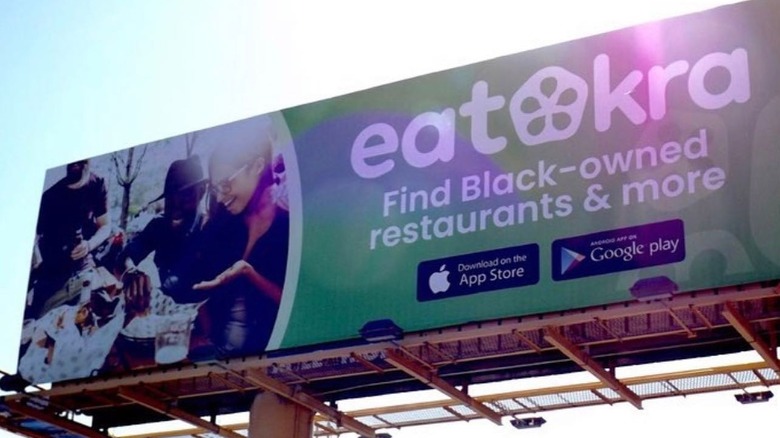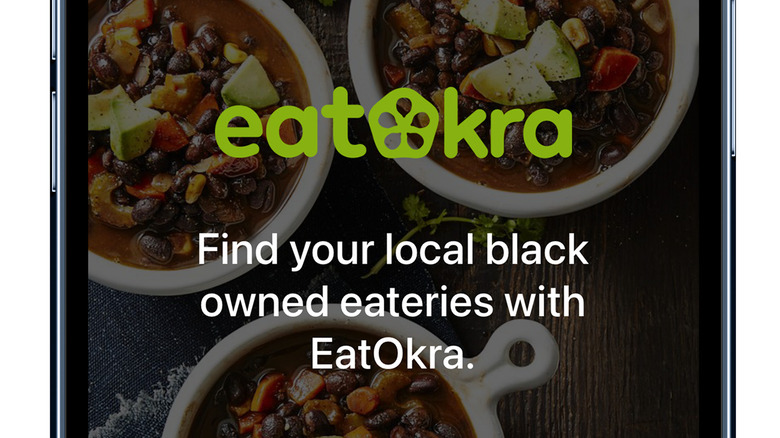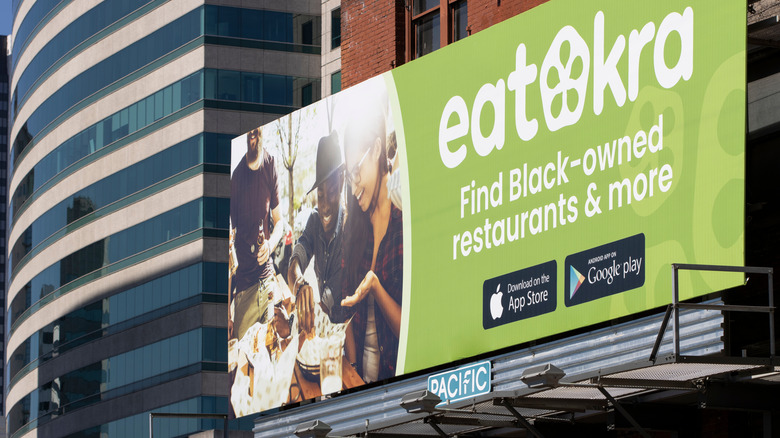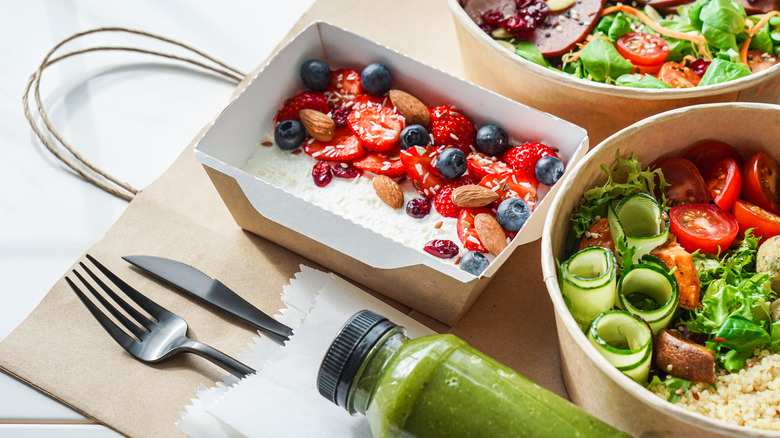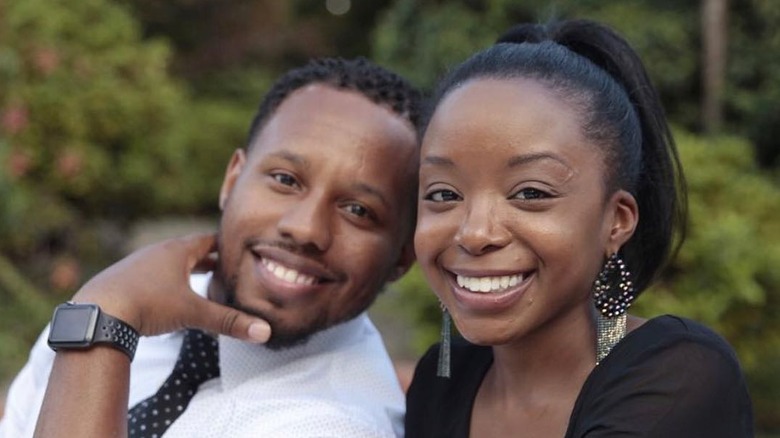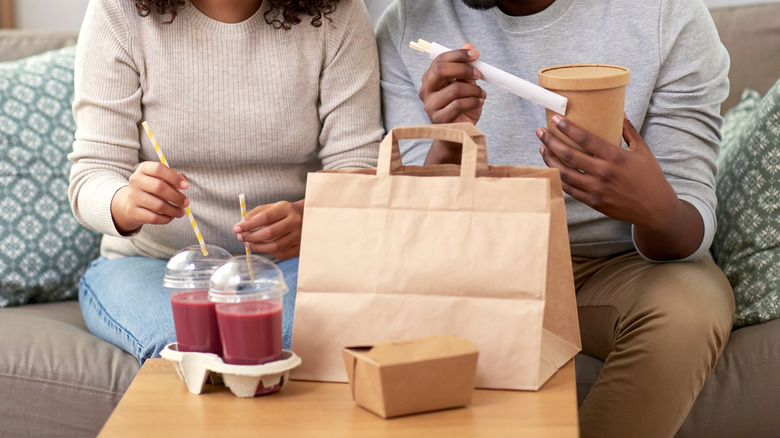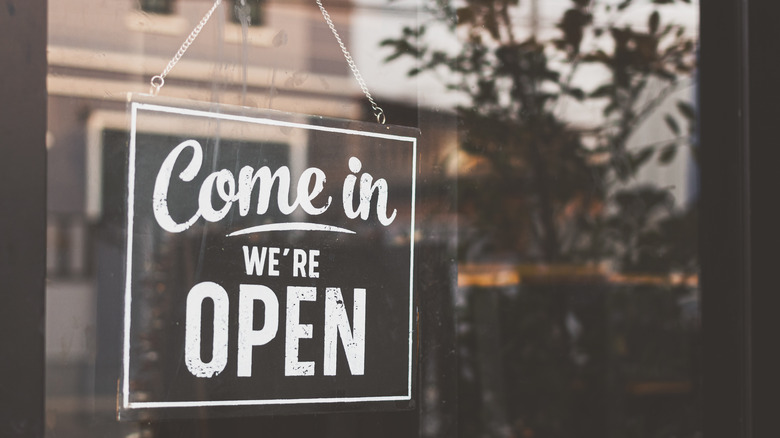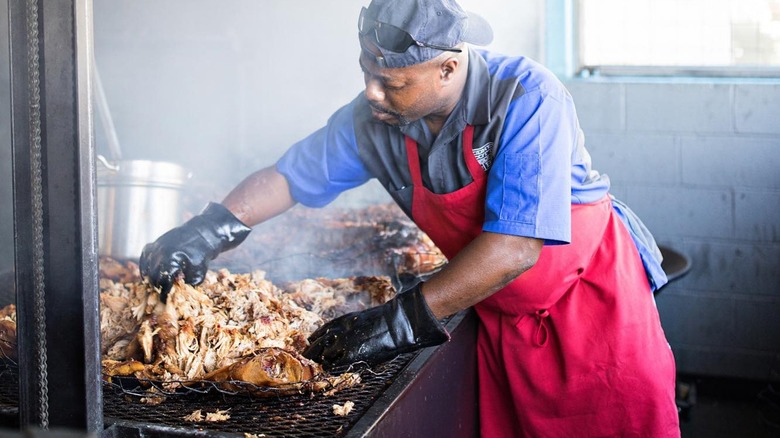EatOkra's Anthony & Janique Edwards Bring Black Owned Businesses To The Masses - Exclusive Interview
It started out as a quest for local restaurants in a new neighborhood. Now, it's a foodie phenomenon, celebrating and empowering black-owned businesses around the country. We're talking about the EatOkra app — and it could be helping you find great places to eat in your own backyard all while taking a stand for social justice.
The app, which is a directory of black-owned restaurants and culinary experiences, was launched in 2016 by husband and wife duo Anthony and Janique Edwards, shortly after they migrated to the diverse culinary landscape of Brooklyn, New York. Their own search for black-owned businesses to support made them realize the need for such a resource, something that's only been further proven by EatOkra's rapid growth and success in a few short years. Now, EatOkra has listings in dozens of cities across the country, with plans to add more restaurants, experiences, and services, while also leaning into its newer mission to become a community resource and learning tool for black business owners. It's making waves along the way, as EatOkra was recently honored by Apple with a Trend of the Year Award.
In an exclusive interview with Mashed, EatOkra's founders, Anthony and Janique, shared more about how EatOkra came to be, and how you can use it to connect with black food culture in your city. They also opened up about EatOkra's pandemic-fueled growth, and how it has evolved the app's mission to serve the black restaurant community. Don't miss their recommendations for two EatOkra-approved restaurants you've got to try.
Founders Anthony and Janique Edwards share the store of EatOkra
In your words, [tell us] the story of how EatOkra came about.
Janique: Eat Okra came about organically as a need for Anthony and myself. When I moved to Brooklyn in 2016, I was very unfamiliar with Brooklyn. [I] didn't really know much about the borough and the community that I was moving into, but I always had an affinity for supporting black-owned businesses. My sister, for a few years, owned a nail boutique in Harlem. Unfortunately, she had to close a few years ago, but my affinity for black-owned businesses started with her business. When I moved to Brooklyn, I was really adamant about supporting black-owned businesses and discovering them and finding them in my area.
Coincidentally, at the same time, when I moved to Brooklyn, my appliances and all my furniture were on back order for about two weeks. For those two weeks, I couldn't cook food or store food. It forced us to venture out to find restaurants to patronize. At the time, Anthony was mulling over building something, an app, to level up his skills as a developer.
Because we were having this challenge of wanting to support black-owned businesses, specifically restaurants in our area, and not having a resource to locate those businesses or not having a central location that we could go to that would make it convenient for us to discover them ... I made a suggestion to him that he build what is now EatOkra, which is a directory of restaurants, so that it would be super easy for us to find those restaurants. That's really how it started, as a tool for Anthony and I to support black-owned businesses and really explore Brooklyn.
From Harlem and beyond, EatOkra's popularity has spread quickly
That had an immediate benefit for the two of you in your neighborhood. What was it like building this out on a national scale and what was that response like around the country?
Anthony: I think when we started, it was like, "Let's explore Brooklyn." Then we were like, "Well, what about Harlem?" We've got family in Harlem. We go to Harlem all the time. Literally, the first time we put it in the app, we went to a restaurant in Harlem, we introduced it to a woman and little did we know she was part of a sorority. She immediately started sharing it with people in Atlanta, and in my head I'm like, "No, don't do that." There were no listings in Atlanta.
Janique and I raced home after that and started adding 20 to 30 restaurants, doing that normal research we were doing to input all the data ourselves at the time. From there, it really started to grow and then her friends started sharing it with people and they started suggesting more [places]. What about this? And what about this?
We actually have a way, inside the app, where people can tell us about new restaurants. We call it a lead. We have another team now, [but] before it was Janique and I, for the first 3,500 restaurants, it was her and I doing this data ourselves. During COVID, we had 8,000 people, 8,000 listings, come to us within about 60 days.
Did you have any way of anticipating how quickly this was going to catch fire and how quickly it was going to grow?
Anthony: No.
Janique: Not at all.
Anthony: We always felt like it could become that over time, but years down the road. At the time, this was a really bootstrap app.
Janique: We knew that it had potential and that people would use it if they knew about it. When media first started reaching out to us, local media, to cover our story and to talk to us about the app, we were seeing anytime a story would go out, little spikes in downloads. We knew that if we ever got to a point where we had the resources and the marketing dollars to put behind us that, potentially, the more people knew about it, the more they would download the app. We weren't in a place to fund any type of marketing.
With COVID, the explosion that we experienced during that time was really unexpected for us because it was really the community that contributed to that in the way of sharing the app organically on social media and different platforms like that. That's how the word got out and that's when we really saw a significant spike.
EatOkra connects foodies with black owned restaurants and culinary experiences
Who is the EatOkra app intended for and how can people get the best use out of it?
Janique: EatOkra is intended for foodies who appreciate different dining experiences, different cultural experiences, but also who have an understanding of the importance of social equity when it comes to black entrepreneurship and black businesses. That can be anyone of any race. That's why we don't typically say that EatOkra is specifically for this group or this group — it's for anyone who believes in these things.
Anthony: I would add it's even for corporations that are looking for ways to support this demographic as well.
How many cities is EatOkra operating in or have listings in now?
Anthony: 35+ cities. Pretty much all your major suspects when it comes to major metropolitan cities — EatOkra is geolocation aware. Wherever you're at in the city, if you open it, it'll tell you what's around. That includes a bunch of smaller second and third size cities.
Besides restaurants, are there other food businesses and experiences that people could connect with on the app?
Anthony: Yep. We list restaurants. We also list food trucks. We're beginning to list caterers, meal prep companies. We also have a marketplace. We're really working on bringing more products to the marketplace for people to purchase on our website.
As of right now, using this app and the directory is totally free. Do you guys intend for it to stay that way in the future?
Anthony: No. We want to keep it free, right? It's going to be a freemium model. Anybody, any restaurateur can sign up and have a free space, but if you're looking to separate yourself from the pack visually through search rankings, you can pay a subscription to do that.
We're also really excited to introduce ordering through the app as well. We want people to directly do commerce through EatOkra and purchase that soul food meal, that barbecue meal, that vegan meal or something from the cafe through EatOkra directly.
EatOkra's mission to build better black-owned businesses
On the one hand, this app is obviously about connecting food lovers to great restaurants, but on the other hand this is also about elevating the black culinary world from the other side. In that sense, what is your goal and your mission with the EatOkra app?
Janique: Right now, we have a lot of room to figure that piece out. We built the app from the perspective of people who love these businesses, who love food, who love to patronize these businesses, and not necessarily knowing what it takes to actually own and operate a restaurant. For us, our next step for our activism, we feel like is developing an e-learning platform for restaurant tours.
I think I mentioned earlier, my sister being a business owner and her business is really what cultivated that love for black-owned businesses for me, but I also got to see firsthand the struggles that she went through as a business owner who really didn't have any experience, really was super green and super passionate about what she wanted to do, but definitely could have benefited from educational resources and mentorship and just community from a business perspective. I feel like, for us, that's our next step and that's what we're striving to build during this season for our business and for the restaurant owners that are a part of our platform.
Anthony: We're in the business of keeping businesses in business, whether that means putting butts in the seat, or it means marketing and other tools, education, mentorship, access. We want to make sure we're really supportive on both sides of the house.
EatOkra became a tool for change during the pandemic
The pandemic wreaked havoc on the restaurant industry across the board, and black and minority owned businesses were hit especially hard. How did your mission and your goals sort of evolve during the pandemic?
Anthony: During the pandemic, it was clear that, especially during George Floyd, when social justice became a serious issue, people were looking for a way to support black-owned businesses which are, for many reasons, hit harder than the rest of their peers. EatOkra became this tool for folks to use through the app store. We had 150,000 downloads as of June of 2020.
When everything started happening with the pandemic, it became abundantly clear for us that it's going to be super important for restaurants to understand the significance of having a digital presence in this day and age because of the way that the pandemic was affecting the industry – in the sense that everything was shut down, there was no foot traffic and people were becoming increasingly reliant on food delivery and discovering businesses online and through mobile apps and things like that — and connecting with businesses from a digital standpoint.
Janique: If you are already struggling as a business owner, the pandemic magnified that in a sense. During the pandemic, we really took a [step] back and said, okay, we have to make sure that this platform that we've built, that it's functioning properly first and foremost, that we're expanding on the features that we offer, but also, talking internally about growing our team to develop those resources that I talked about earlier, the e-learning platform that we're working on.
During that time, we partnered with Jason Wallace. He's now our partner and he is a restaurant consultant. I don't know if we would've gone that direction without the pandemic, but it definitely put in our heads that, outside of offering this digital platform that makes it easy for people to discover these businesses, how can we grow the company and expand our offerings to help them in this vulnerable state?
EatOkra's founders on being named one of Apple's top apps
EatOkra was recently honored with the Apple Trend of the Year Award for making these meaningful connections. What did it feel like and what did it mean to be acknowledged like this?
Anthony: I think we're still trying to let that sink in. The last 18 months have been a whirlwind. We knew we were making some impact, but how big of an impact was really confirmed by the Apple team for even considering us for this award. For us to actually be one of 15, it's a dream come true. I didn't really know too much about it, but Tim Cook jumped on our call, CEO of Apple, and gave us this award. It's like, wow, I was not expecting that at all. I'm happy. It's our Oscars. It can be my Oscar as a developer and it's something I'll always have. You can't take it away and I'm so grateful for it.
Janique: It was an honor, considering all the other apps that were also recipients too and knowing how hard Anthony and I have been working. It's difficult to take a second sometimes to acknowledge those wins because you're in the weeds of things a lot of the time. To have that moment was really special and it was super affirming of the work that we're doing and super motivating as well for us, because we definitely want to see the company grow and we want to accomplish so much more for the community. It was really a super huge moral boost for us and our team.
Fast forward six years, EatOkra is basically a household name for hundreds of thousands of people and now that you've gotten this recognition and you've seen what's possible, how has that changed and evolved your goals for the app as a community resource now?
Janique: We always had huge, huge goals, but to receive acknowledgement from arguably one of the most innovative companies ever, like I said, it's super affirming for us. It's like, okay, now that we've got that stamp of approval from Apple, now we feel even more motivated that we have to live up to this. There's a standard now, and we've accepted the challenge and we are ready to grow and expand. That's why, this year, we're gearing up to do our first race ever. That put us in the perspective of, okay, now it's go time, and we need funding to grow in the way that we know we can.
Food delivery and more is coming to EatOkra in 2022
You mentioned growing this marketplace, you mentioned order delivery. Could you elaborate on that a little more and is there anything else that we should be looking out for from the app this year?
Anthony: Updating our marketplace and reskinning it, and getting more products there. On the orders, it's brand new to us. We're going to be starting out in New York City. We'll be rolling out in probably about three or four months, and then we'll hit Atlanta, DC, Houston, LA, and Chicago.
There's some other things we want to list, like events through the apps. We want people to know about the next festival or dinner or brunch party, sip and paint, things like that. We want to make sure EatOkra is a really holistic 360 [degree] kind of experience where you can learn by going, learn by discovery. You're able to purchase pantry items. I can purchase my favorite Caribbean cuisine, African cuisine.
I can also learn about some stories. I can learn what this meal means and what it does to the founder or the owner. What did their grandmother teach them growing up that made them want to have a restaurant? We were just at a restaurant called Gillie's in South Carolina, and I think it's about third or fourth generation in, [and] the grandmother had all the recipes, but she never saw the restaurant, never had a restaurant. Right before she passed away, the children founded the restaurant and they showed it to her and brought her inside right before she passed. If you go inside the restaurant, you see pictures of a bunch of grandmothers. Anybody whose grandmother they want to put in the restaurant, they can give them a frame and a photo, and it's a whole wall full of grandmothers from different generations.
Can you share a few more details with me about what's in the works with this e-learning platform?
Janique: We're still in the development of our e-learning platform. We partnered with Jason Wallace who's a restaurant consultant [and Culinary Institute of America] graduate for 13 years now. He's also a teacher. Right now, we're testing, seeing what the community really needs. He's been doing some one-on-ones with a few of our EatOkra members and assessing where they are with their businesses and what needs they may have as we prepare to develop course curriculum and things like that. We're still very much in the infancy stage of that, but we're hoping to use those insights for the development this spring.
Anthony: The goal would be, we'll be doing cohort style and then at the end of it would be a do-it-yourself, sign up, take the courses, take the quizzes, things like that on demand.
An important reminder about the restaurant industry and those who work in it
What do you guys wish more people knew and understood about black food culture and especially from a business perspective?
Anthony: Give some grace a little bit. It's tough to be a restaurant owner, dealing with, many times, restaurateurs who don't have the staff or the time, which means, a lot of times, they're working [for] their business versus working their business. [Instead of] doing the CEO things they should be doing, they're taking orders. Being patient, giving some grace, understanding every restaurant wants to give you the best experience, but things happen — that's what I think I've been learning the most. There's a lot going on behind the scenes and to be cognizant of that in your reviews and in your critiques.
Janique: From a business perspective, what I've seen is a lot of times people, especially in the restaurant business, they start a restaurant because they're super passionate about cooking and about food, but don't really have an understanding of what it takes to manage the day-to-day of the business and manage people. What I've learned from Jason is that there's a science to restaurant ownership. Because the margins are so thin, you have to be obsessed with the numbers a bit and if you're not in tune with those numbers and you're not accurately capturing that data, it's going to be very difficult for you to make money and grow and scale.
There's something to be said about starting your business because you're passionate, but also understanding that it's going to take a lot of ... it's going to be a very meticulous thing in managing those numbers to make sure that you're making money for your business.
Anthony: I would say to add to that, a restaurant can make $1 million in a year, but that doesn't mean you're profitable, right? If that formula is not correct, you could still be going under. It's really making sure that you know that formula, those numbers, over your net operating income.
EatOkra-approved restaurants to check out in Charleston
Are there any particular favorite restaurants or experiences on the app right now that you'd like to highlight?
Janique: Anthony and I had the opportunity to go to Charleston, South Carolina last week for the wine and food festival. We got to visit two restaurants on the app during that time. Rodney Scott's Barbecue [is] very, very good barbecue down in South Carolina. I believe Rodney Scott was actually on ["Chef's Table BBQ"] as well. A lot of people know him from that, but very, very great barbecue. Also, Gillie's Seafood, which Anthony mentioned earlier, super inspiring story about the grandmother who inspired her kids. They created that restaurant in her honor. There's a huge gallery wall, as Anthony mentioned, of grandmothers from customers to people that have worked the restaurant over the years. Their grandmother is front and center on that wall as well, but also amazing, amazing food. We had so much good stuff to eat there. Shrimp and grits, soul rolls, catfish. Everything was delicious, fresh, very good food.
The EatOkra app is available for download on the App Store and Google Play.
